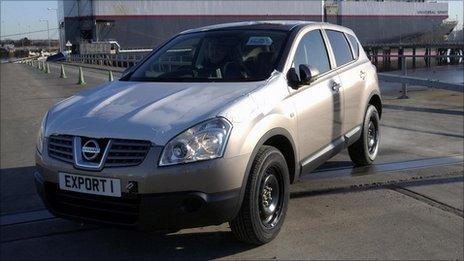The secrets behind Nissan's Sunderland success story
- Published
- comments
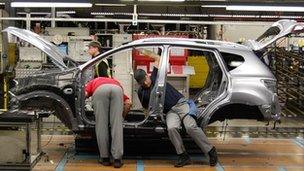
Nissan's ability to produce cars people want at a good price is a big part of the success in Sunderland
Nissan's decision to build its new Invitation car in Sunderland is the third statement of confidence in the plant in the last two years.
In 2010 the company announced plans to manufacture the new electric Leaf in Wearside and last year it said it would also produce the new Qashqai on the site.
The 400 new jobs that will flow from this latest investment will take the number of staff there above 6,000 - a record for Nissan at Sunderland, external.
A further 1,600 jobs are expected to be created in the supply chain, as 100,000 Invitations a year roll off the production line.
Success story
It's a remarkable success story for a site that celebrated its 25th anniversary last year.
Yet just three years ago, everything looked grim. The company had just announced 1,200 job cuts and was cutting production.
The UK motor industry appeared to be in turmoil, with even the super-efficient Nissan plant under pressure. So how has the company managed to turn impending crisis into record employment?
The first credit has to go to the leadership at Nissan. The company has come up with successful cars - the Qashqai in particular has proved a worldwide hit.
The manufacturer has seen its market share boosted by producing cars that people want.
Trevor Mann, Nissan's head of production in Europe, said: "Nissan has been growing significantly in Europe over the last few years.
"Despite the Euro crisis the European market has grown by 4%, and our market share has grown by 25%. We produced 140,000 more cars last year than we did in 2010.
"The market proves if you have got a good car at a competitive price, you can grow."
Most efficient
Then there is the workforce. Nissan's Sunderland plant is the most efficient in Europe, with exceptional industrial relations.
That has helped secure work which could have gone elsewhere in the group.
But there are other factors.
The weakness of the pound makes the UK an attractive place to manufacture at the moment, adding to Nissan's profit margins.
And then there is politics. Both the coalition government and Labour have claimed credit for creating the conditions that are allowing Nissan to thrive.
The coalition points to the £9.3m grant Nissan has recently had from the Regional Growth Fund - although it has yet to be paid out.
It also believes it is creating the economic conditions, external that encourage investment.
Business Secretary Vince Cable said: "It is very positive, but you can't see this in isolation, because the other big car companies have also made major commitments to the UK.
"Jaguar Land Rover, Ford, BMW and Mini are all putting in more money."
Car scrappage
But Labour says the previous government also deserves credit for the action it took when the car industry faced a crisis in 2008 and 2009.
The car scrappage scheme helped to prop up domestic demand at a time when it looked likely to collapse. The Brown government also provided support for Nissan's electric car plans
And Labour also established the Automotive Council in 2009 to help the UK motor industry.
Shadow Business Secretary Chuka Umunna said: "In government Labour adopted an active approach to the UK automotive industry, establishing the Automotive Council, encouraging and supporting collaboration on research to benefit the entire sector - an approach which Vince Cable has said helped foster confidence for companies to invest here.

A patriotically-painted Nissan Qashqai outside 10 Downing Street
"Consequently automotive now represents 10% of total exports with 80% of automotive production being exported."
Of course, politicians all love being associated with a success story, but in truth it has probably taken a combination of all these to secure the latest investment at Nissan.
But it's not all rosy in the North East. Just hours after the Nissan announcement, Rio Tinto confirmed it would be closing its aluminium smelter in Northumberland on 29 March.
That will lead to 323 job losses in May, with more likely to follow in coming months.
A taskforce will now try to find ways of attracting new investment to the area around the Lynemouth plant.
But if any of the Rio Tinto workers can travel, there are already 31 new jobs in Sunderland being advertised on Nissan's website.
- Published6 March 2012
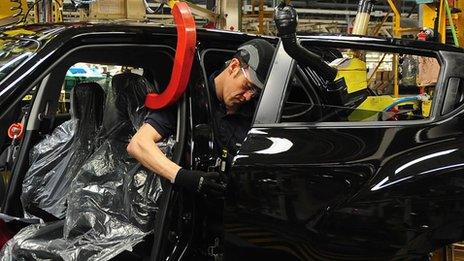
- Published6 March 2012
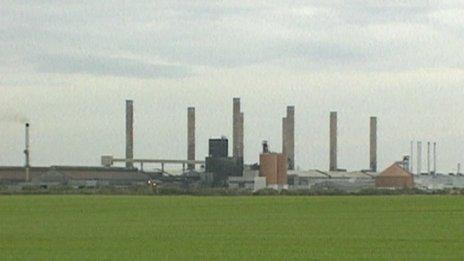
- Published8 September 2011
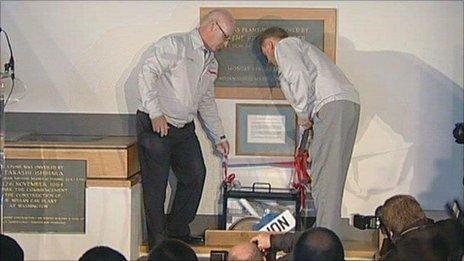
- Published8 June 2011
